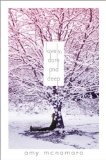Summary | Excerpt | Reviews | Beyond the book | Read-Alikes | Genres & Themes | Author Bio

It is deep winter and the mornings have been dark for a while now. But I remember when I actually registered it. Perception is funny that way. Change gradually happens over time, but noticing it takes one studied moment. All of a sudden - or maybe not - you perceive that shift in the seasons. I look out the window as I get dressed in the early mornings and it feels as though it is the middle of the night. My running buddies and I begin our run in the woods by the river in the dim, grey-black light of dawn now; that strange, sort of other-worldly time when eyesight is a secondary, sort of backseat sense, when my feet intuitively take over and I don't even have to think about navigating the trail.
It's been a dark, otherworldly kind of week in other ways too. A Lovely, Dark, and Deep kind of week, in fact.
This haunting, lyrical story is Amy McNamara's debut, but it is clear that she is an accomplished poet who loves words and the very specific ways deep, true emotions can be conveyed by them. In Lovely, Dark and Deep, Wren, the main character, is struggling with the darkest kind of grief: she was in the car accident that killed her boyfriend. She has survivor's guilt, the horror of complicated circumstances, and a sadness that is so deep it renders her, for a time, literally speechless. She decides to postpone going to college and move to the far north coast of Maine, instead, to live with her artist father. There, she is unable to motivate herself to do anything - but run. She takes long runs through the dark and cold Maine woods at the edge of the ocean.
McNamara spends a lot of time showing the reader these runs. And I have been wondering about that. Why does McNamara do this? What allows Wren to run when she simply cannot function in any other way? What is it about being in the woods and by the water that is tolerable, or familiar, or perhaps even comforting? What is it about the dark and the cold that has, at times, a startling warming and illuminating effect?
Wren says early on: "I came here because it's pine-dark and the ocean is wild. The kind of quiet-noise you need when there's too much going on in your head. Like the water and the woods are doing all the feeling, and I can hang out, quiet as a headstone, in a between place. A blank I can bear."
I think McNamara's use of language is stunning. It conveys image and emotion specifically and perfectly. Although my circumstances are, of course, extremely different from Wren's, I can't help but also think of my runs. The intersection of the woods and water with the cold and dark is an otherworldly place. It is a place void of the objects that are imprinted with your routine and your history, it is a place where your brain can take a rest from sending out invisible threads of connection. You simply are in this place, now. Feet pounding, breath puffing, heart pumping.
Wren's runs serve as a gauge for how she is coping and healing in the rest of her life. With the help of Cal, a sensitive and kind man who is suffering from his own sort of grief, as well as the help of her father and a few other characters, Wren begins to dig herself out of the deep, dark hole in which she is stuck.
There were times when I felt like the story moved too slowly. But unlike my perception of the days growing darker, change does not happen in one moment. And McNamara writes about grief in a truly organic, true and palpable way and articulates just a fraction of the painstakingly slow process that healing can be. It is no surprise that she performs this task so well – she wrote Lovely, Dark and Deep after the death of a close friend.
I come to the conclusion that performing a ritual - in this case running - against a natural landscape, offers a very special experience of connecting to a rhythm (of seasons, of sunrise to sunset, of waves and wind) that is at once separate and a part of you. Of course the landscape holds its own deep histories and stories, and they matter to all of us (we would be wise to listen) but maybe what I mean to say is that those stories and those rhythms allow us to use our bodies - legs, lungs, hearts - to physically work through our problems.
Amy McNamara makes reading Lovely, Dark and Deep a place to do the same.
I highly recommend this book to young adults and adults alike, especially those who love lyrical writing and deep emotional exploration.
![]() This review was originally published in The BookBrowse Review in January 2013, and has been updated for the
November 2013 edition.
Click here to go to this issue.
This review was originally published in The BookBrowse Review in January 2013, and has been updated for the
November 2013 edition.
Click here to go to this issue.

If you liked Lovely, Dark and Deep, try these:

by Jennifer Longo
Published 2016
Darkly humorous and heart-wrenchingly beautiful, Jennifer Longo's YA debut about a girl stuck living in a cemetery will change the way you look at life, death, and love.

by Jandy Nelson
Published 2015
A brilliant, luminous story of first love, family, loss, and betrayal for fans of John Green, David Levithan, and Rainbow Rowell. Winner of the BookBrowse 2014 Award for Best Young Adult Novel.
Your guide toexceptional books
BookBrowse seeks out and recommends the best in contemporary fiction and nonfiction—books that not only engage and entertain but also deepen our understanding of ourselves and the world around us.